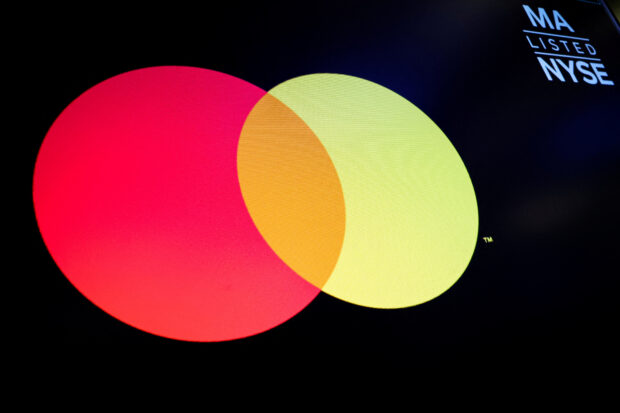Visa, Mastercard reach $30 billion settlement over credit card fees

A screen displays the company logo for Mastercard Inc. on the floor at the New York Stock Exchange (NYSE) in New York City, U.S., February 29, 2024. REUTERS/Brendan McDermid
NEW YORK — Visa and Mastercard reached an estimated $30 billion settlement to limit credit and debit card fees for merchants, with some savings likely to be passed on to consumers through lower prices.
The antitrust settlement announced on Tuesday is one of the largest in U.S. history, and if it receives court approval would resolve most claims in nationwide litigation that began in 2005.
READ: This credit card may soon be used in place of Beep
Some critics believe it may not go far enough, saying the savings would be temporary and fees would remain high.
Merchants have long accused Visa and Mastercard of charging inflated swipe fees, or interchange fees, when shoppers used credit or debit cards, and barring them through “anti-steering” rules from directing customers toward cheaper means of payment.
Swipe fees typically include small fixed fees plus a percentage of total sale amounts, and average about 1.5% to 3.5% per transaction according to Bankrate.com.
Under the settlement, Visa and Mastercard would reduce swipe rates by at least four basis points – 0.04 percentage points – for three years, and ensure an average rate that is seven basis points below the current average for five years.
Both card networks also agreed to cap rates for five years and remove anti-steering provisions.
READ: Americans have saddled themselves with credit card debt
Merchants will have more discretion to offer discounts, or impose surcharges on cards with higher interchange fees.
Many already warn customers at checkout they will pay more using cards instead of cash.
The fee rollbacks and caps alone are worth $29.79 billion, according to court papers, and Visa estimated that small businesses comprise more than 90% of the settling merchants.
Visa and Mastercard denied wrongdoing in agreeing to settle.
In separate statements, Visa’s North American president Kim Lawrence said the accord addressed “true pain points” identified by small businesses, while Mastercard General Counsel Rob Baird said it gave businesses “substantial certainty.”
Shares of Visa closed down 0.2%, while Mastercard rose 0.2%.
Opposition expected
The settlement came one year after the federal appeals court in Manhattan upheld a $5.6 billion class action settlement with Visa and Mastercard, covering about 12 million merchants.
Some merchants opted out of that settlement and are pursuing separate lawsuits seeking damages.
Adam Levitin, a Georgetown University professor of law and finance, in an email said those merchants might object to Tuesday’s settlement because it would bind them.
Levitin said U.S. merchants would still pay an average 219 basis point swipe fee, the highest in the developed world.
“If that’s the result of nearly two decades of litigation, then the settlement is a huge loss for U.S. merchants,” he said.
Tuesday’s settlement requires approval by U.S. District Judge Margo Brodie in New York City’s Brooklyn borough, likely not before late 2024 or early 2025, and appeals are possible.
“It’s a bad deal for merchants,” said Doug Kantor, general counsel of the National Association of Convenience Stores, in an interview. “It provides very small, very temporary relief, but afterward Mastercard and Visa will be free to raise rates, and the agreement doesn’t provide a mechanism to slow an increase.”
The Retail Industry Leaders Association, which represents businesses that employ more than 42 million Americans, said the settlement required closer review but amounted to “a mere drop in the bucket.”
Concessions
TD Cowen analyst Jaret Seiberg wrote that small banks and credit unions may object because big retailers such as Walmart could cut deals with larger banks for cards that offer discounts at checkout.
But he said the accord reflects “extraordinary concessions” by Visa, Mastercard and banks because merchants can impose surcharges on airline and cash-back credit cards, though few may because they would rather complete sales than save on fees.
Joseph Stiglitz, a Nobel Prize-winning economist and expert hired by the settling merchants, in an affidavit said the settlement could provide them with “very substantial” savings.
“Competition among merchants results in these cost savings being passed on to customers in the form of lower prices,” Stiglitz added.
The plaintiffs’ lawyers said Visa and Mastercard agreed to pay up to $170 million of their legal fees and expenses.
Some U.S. senators have promoted legislation, the Credit Card Competition Act, to let merchants process Visa and Mastercard credit cards through other payment networks.
Darrin Peller, an analyst at Wolfe Research, wrote that Tuesday’s settlement “likely takes some wind out of the sails” of that effort.
The case is In re Payment Card Interchange Fee and Merchant Discount Antitrust Litigation, U.S. District Court, Eastern District of New York, No 05-md-01720.














